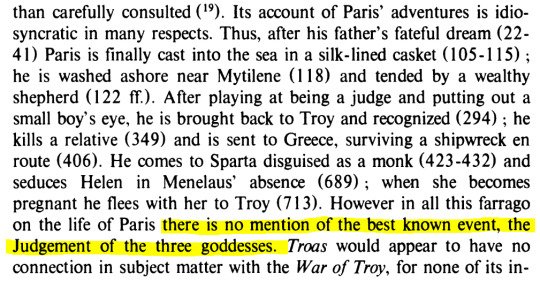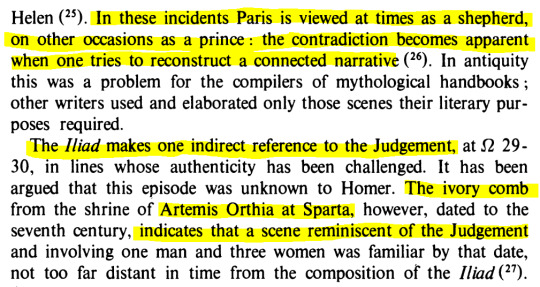#Cartledge
Explore tagged Tumblr posts
Photo

Samuel
Samuel is a character in the Hebrew Bible and the Old Testament, uniquely depicted as having served several roles, as judge, military leader, seer, prophet, kingmaker, priestly official, and loyal servant of Yahweh. He is traditionally thought to have played a pivotal role in ancient Israel's transition from the judges to the monarchy.
Authorship
Of the many ways the story of Samuel in the Bible is viewed, Tony Cartledge suggests, "While putting more or less trust in the veracity of the materials, the reader must approach the text on at least two levels: as story and as history" (13). Based on 1 Chronicles 29:29-30, the books of Samuel in the Old Testament are traditionally thought to have been primarily authored by the person Samuel, "with supplementary information about the period following his death being supplied by the prophets Nathan and Gad" (13).
However, modern scholarship provides another view. When the particulars of purported accounts of historical events diverge, this suggests multiple authors or sources. For example, in the flood story in Genesis, one version has Noah gathering one pair of each kind of animal; another has him gathering seven pairs of clean animals and one pair of unclean animals; in one account, Noah sends out a dove; in another, he sends out a raven; in one version the flood lasts a year; in another 40 days and 40 nights, and so on. The Bible is replete with such instances. That is an indication, as Richard Friedman says, "of a skillful redactor capable of combining and organizing separate documents into a single work that was united enough to be readable as a continuous narrative" (60). After all, someone somewhere brought the compilation of material we know as the Bible to its final version.
As the Hebrew Bible has been translated largely through the Masoretic Text and Greek Septuagint, in modern times, the source-critical view of authorship has come to play a prominent role in the historiography of the Bible. Building on the works of others, German biblical scholar Julius Wellhausen (1844-1918) brought what has come to be known as the "documentary hypothesis" of authorship into a more thorough form. According to Wellhausen, for the first five books of the Bible, known as the Pentateuch, an editor had at his disposal the works of four authors of different classes, writing at three different stages of Hebraic religious evolution. The earlier J (Jehovah) and E (Elohim) sources "reflected the nature/fertility stage of religion. Writing later, D (Deuteronomy) reflected the spiritual/ethical stage, and P derived from the priestly/legal stage" (Friedman 24-26). While many other aspects of Wellhausen's work have been criticized, the idea of redaction of multiple sources remains the basis for source-critical methodology.
A second seminal and more recent contribution comes from Martin Noth (1902-1968). His Deuteronomist history postulates that the books of Deuteronomy, Joshua, Judges, 1-2 Samuel, 1-2 Chronicles, and 1-2 Kings were all "the work of a single writer working in the exilic period, who organized the various old units and complexes of material available to him into a continuous history of Israel from the entry into Canaan until the beginning of the exile" (McCarter, 4). Considering style, language, and thematic similarities to Deuteronomy, Noth identifies the writer of Deuteronomy, with the interests of P, as the sole compiler and editor of the books of Joshua to 2 Kings.
However, with a revision, Frank Moore Cross (1921-2012) places a primary edition (Dtr¹) to the pre-exilic time of king Josiah with a secondary touched-up version (Dtr²) completed during exile. Finally, Richard E. Friedman postulates that Dtr¹ and Dtr² were the sole collaborative works of the prophet Jeremiah and his scribe Baruch, as they fit the bill of P and were alive during Josiah's reign and were together in exile in Egypt.
Concerning Samuel as part of Deuteronomist history, several divergences suggesting multiple authors are pointed out.
Besides the twice-mentioned death of Saul (1 Sam 31; 2 Sam 1), there are other duplicate versions of the same events. Eli is twice warned that his priestly dynasty will fall (1 Sam 2:27-36; 3:11-14). There are two accounts of Saul's public acclamation as king (10:17-24) and two of his rejection (13:14; 15:23). When David flees from Saul, he is twice betrayed by the Ziphites. (Cartledge, 4)
Then there are hard-to-reconcile accounts, as in 16:14-23, where David becomes Saul's personal musician and assistant, yet in the next chapter, when David offers to fight Goliath, he is unknown to Saul. Then there is the antagonism towards the monarchy in 7:1-8:22, but in chapters 9-11, a seeming vote for it "as a means of divine deliverance" (Cartledge, 4). Moreover, there are stand-alone sections such as Hannah's Song, the Ark Narrative, and the Court History of David, where there is no mention of Samuel though in other places he is purported to have vetted and anointed the king.
There remains a lack of consensus as to when excerpts were written and collated, the number and level of completion of the sources received, and if there were one, two, or a school of editors. Regardless, the seriousness and respect with which the source materials were handled are reflected in the fact that divergent narratives were maintained, even though it might have been tempting for the sake of a stronger appearance of historicity to delete countervailing ones.
Moreover, while the source-critical method of the historiography of the Bible has maintained the lion's share of attention within scholastic circles for some time, in recent times, literary criticism and inquiry into the social world of the Bible are making important contributions. Archaeological finds are also having their impact. The Zayit Stone, discovered in 2005 and dating to the 10th century BCE, inscribed with the Old Hebrew alphabet, may, for some, moderate the position of a narrative built on eons of oral tradition. It appears the Hebrews were literate early on, which may shed new light on source material considerations. Friedman's theory that Baruch was the final author of Deuteronomist history is strengthened by the Baruch stamp find, which shows that a person named Baruch lived and was a scribe at that time. The Aramaic inscription bytdwd from Tell Dan recently discovered by Avraham Biran and J. Naveh, as it is thought to be translated as "House of David," confirms for some the historicity of king David and lends credit to the stories surrounding him and those such as Samuel, associated with him.
Nonetheless, as Cartledge shares, camps for and against the historicity of the Old Testament are divided into the minimalist approach "of the Alt-Noth school who argue that scientific historiography cannot simply accept the Old Testament at face value" and the maximalists "from the Albright-Bright circle who believe the Old Testament documents are more trustworthy and while acknowledging discrepancies, may be used to reconstruct the history of ancient Israel" (9). As part of that history, the story of Samuel is one of transition between the period of the judges and the monarchy. Portrayed to have facilitated that passage, Samuel is shown serving several leadership roles.
Continue reading...
23 notes
·
View notes
Text

2 notes
·
View notes
Text
chicken bone for mices
#its probably a little to fatty but its a special treat#the protien vitamins and minerals of the bones and cartledge will be good for them#and its good for their teeth#mice#the girlies#its leftover from dinner but it didnt have any seasonings spices or sauces dont worry
2 notes
·
View notes
Text
Having a nerdy morning.
Paul Cartledge giving a lecture on Democracy in Ancient Greece.
1 note
·
View note
Text
“How Reliable is Herodotus’ Account of the Persian Wars?
Answer by Paul Cartledge
Herodotus was not just any old historian but the founder of an entire intellectual discipline and practice, or craft, the one that I am honoured to try my hand at myself. Opinions differ today, as they always have done, on what exactly a historian’s chief task or aim should be, but Herodotus made a pretty good stab at adumbrating it in the famous Prooimion or Preface to his Histories (‘Researches’, ‘Enquiries’): he wished both to record for posterity and to celebrate ‘great and wonderful deeds or achievements (erga)’ and – above all, N.B. – to explain them. In his particular case what he wished to explain above all was why and how and thanks to whose responsibility Greeks and non-Greeks (principally Persians) had come to fight each other.
He had in mind as his subject what we today call the ‘Persian Wars’ or (more accurately) Helleno-Persian Wars, as those were fought out by land and sea on either side of the Aegean at the far eastern end of the Mediterranean Sea between 490 (Battle of Marathon) and 479 BC/BCE – or from 499 to 479, if one includes also the essential preliminary ‘Ionian Revolt’ (499-4), since this was the first occasion on which Greeks, then many of them subjects of the mighty Persian empire, had engaged in warfare with their ‘barbarian’ (non-Greek) masters in pursuit of the ideal of political freedom. That (unsuccessful) revolt gave Herodotus, himself an Eastern Greek from Asia Minor (Halicarnassus) and born c. 485 a Persian subject into a mixed Greek-barbarian family, his own dominant theme.
It was always clear to Herodotus where his linear chronological narrative would end – 479, with the final victory for those (few) Greek cities led by Sparta and Athens who had dared to resist the intended Persian conquest of all mainland Greece led by Emperor Xerxes. But where to begin? Herodotus boldly chose what we call the mid-6th century or c. 550 BCE for his starting point, but how could he possibly claim to know or at any rate confidently believe anything at all about events and processes ongoing some 70 years or two to three generations before his own birth? Given that he seems not to have been able to speak or read any language other than his own Greek (he wrote in the Ionic dialect but spoke in Doric), and given that the Hellenic world of the mid-6th century was not a world either of extensive official public documentation or of extensive prose-writing of a descriptive, factual nature, he had no choice but to become not only the world’s first historian but also the world’s first oral historian. That is to say, the chief type of evidence – not quite the only, since he does quote some documents and cite some physical monuments– that he gathered from about 450 to 430 was the oral testimony of either face-to-face or second-hand informants. Those informants moreover were either native Hellenophones or non-Greeks with a sufficient command of Greek.
It is hugely to his credit that Herodotus evolved a sophisticated hierarchy of value in interpreting such oral testimony, a hierarchy according to reliability. Top of the table was what he called opsis, or autopsy, meaning first-hand testimony whether of his own or of those of his informants who had actually viewed or participated in the events related, including evidence of physical monuments (another meaning of erga). After that, some way after, came what he called akoê or hearsay evidence, evidence that might reliably go back ultimately as far as two to three generations (but no farther) before his own time. Both types of evidence however were then further subjected to the reliability test: were his informants to be trusted – or might there perhaps be reasons why they would provide him knowingly or unknowingly (‘false memory syndrome’) with false testimony both as to facts and as to their interpretation?
At this point it’s necessary to state unequivocally that Herodotus was in no way an official historian, indeed his work has been characterised as the very denial of official history – that is, of the sort of records – or propaganda sheets – put out by middle eastern rulers or priestly castes. But even if he was not compiling and composing in the interests of any particular state or power-group, does that mean he was always himself disinterested either in what he chose to relate or in how he chose to relate it? Here Herodotus is vulnerable to two kinds of negative critique: first, that in interpreting the deeds of humans he nevertheless was too quick to invoke the notion of supernatural or divine intervention as an explanatory mode, that he was in short too theological; second, that he did not always sufficiently perceive the bias of his informants, whether they were members of an aristocratic Athenian family or members of a hereditary Egyptian priesthood. Both those critiques seem to me to have some force. And Herodotus himself was clearly very aware of the second: in response he claimed, somewhat speciously, that it was his job to ‘relate what he was told’ and that it shouldn’t be assumed he necessarily believed it. (I should probably here add that I do not myself believe the hyper-criticisms that have been levelled at Herodotus since antiquity, to the effect that he just made things up, or that, for example, he didn’t in fact view the monuments and cities abroad such as Babylon that he claimed or implied he had seen.)
Reliability, finally, operates on several levels – from a particular detail of his account of say the finally decisive Battle of Plataea all the way up to the alleged motivation of Xerxes in planning and effecting his simply massive expedition (though not as massive as Herodotus believed – here he was certainly guilty of considerable factual inaccuracy). If we make due allowance for an excess of theology, for a weakness for large numbers, and for an occasional prejudice in favour of or against a particular key player (for Athens at the Battle of Salamis, for instance, or against King Cleomenes I of Sparta and Themistocles, or – as Plutarch vehemently protested – medizing Thebes), then I think we may confidently say that Herodotus’ historical judgement is remarkably reliable given the conditions in which it had to be exercised.
I have left to the end a bit of a ‘stinger’. Almost all that I have written above applies to Herodotus the historian of the Helleno-Persian Wars conceived pretty much as we would frame that still vitally important topic today. Herodotus, however, deployed and depicted a far broader and richer canvas, since besides being that historian he was also what we would call today a pioneer ethnographer and comparative social anthropologist, interested to discover and compare the nomoi – laws and customs – of a multiplicity of non-Greek peoples living adjacent to the Hellenes, above all others the Egyptians (book 2) and a variety of what he called ‘Scythians’ (book 4). In this area Herodotus’s vulnerability to deception, disinformation or sheer ignorance was far greater, and his reliability correspondingly far smaller.
Further Reading suggestions: With apologies for apparent self-promotion, I develop the above discussion at greater length in my introduction to Tom Holland’s bold new Penguin Classics translation (London 2014). See also my 2017 (Chalke Valley History Festival) History Hub blogpost. An inventive way of re-reading Herodotus is William Shepherd’s The Persian War in Herodotus and Other Ancient Voices (Oxford 2019). A particularly good ‘very short introduction’ to Herodotus is Jennifer T. Roberts’ Herodotus (Oxford 2011). Roberts is also the editor of the excellent Norton Critical Edition of the Histories as translated by Walter Blanco and accompanied with a wide variety of supporting essays by Blanco (London 2013).’
Source: the site of Herodotus Helpline ( https://herodotushelpline.org/how-reliable-is-herodotus-account-of-the-persian-wars/).
Very good text from a very important Classicist. My only criticism is that I think that Pr. Cartledge does not take sufficiently into account the fact that Herodotus’ ethnography, despite its inevitable flaws and errors, offers often accurate and important information on the customs of non-Greek peoples (and even in other cases in his ethnography, in which Herodotus is mostly wrong, there is a kernel of truth in what he relates or at least he preserves aspects of how some ancient peoples of his time showed themselves, their past, and their neighbors).
3 notes
·
View notes
Text
went to one of my fave used bookstores and walked out with two books on sparta i am not ok
#i listened to a podcast on juicy thucy recently and it started the Fever#i miss....... reading......#i need at least one cartledge book on my shelf or im not a real scholar lol#hapo rambles#i still have a book on thucy i havent finished#i have primary sources i havent started#i have a book on athenian women i need to read still etc#personal hapo
6 notes
·
View notes
Text

Bad movie I have My Favorite Wife 1940
#My Favorite Wife#Cary Grant#Irene Dunne#Randolph Scott#Gail Patrick#Ann Shoemaker#Scotty Beckett#Mary Lou Harrington#Donald MacBride#Hugh O'Connell#Granville Bates#Pedro de Cordoba#Jean Acker#Murray Alper#Leon Belasco#Joe Cabrillas#Bill Cartledge#Chester Clute#Corky#Franco Corsaro#Florence Dudley#Hal Gerard#Roque Guinart#Earle Hodgins#Edna Holland#Thelma Joel#Cy Kendall#Donald Kerr#Max Linder#Ellen Lowe
3 notes
·
View notes
Text



Asthall Manor, Oxfordshire, England by Stacy Cartledge
#asthall manor#oxfordshire#nature#england#uk#united kingdom#flowers#garden#nature aesthetic#2025#petitworld
8K notes
·
View notes
Text
Top Ten Tuesday was created by The Broke and the Bookish and is now hosted by That Artsy Reader Girl. It was born of a love of lists, a love of books, and a desire to bring bookish friends together. Each week a new theme is suggested for bloggers to participate in. Create your own Top Ten list that fits that topic – putting your unique spin on it if you want. Everyone is welcome to join but…

View On WordPress
#alix e harrow#cathy glass#el james#jennette mccurdy#matthew reilly#milly johnson#paul cartledge#rainbow rowell#stephen king#stephenie meyer
1 note
·
View note
Text

paris of troy! during those years he was a shepherd.
I was reading cartledge's book on thebes and every now and then the spartan focuses wrt to the pantheon of gods comes up. sparta has nothing to do with this except for where it does, but apollo karneios was discussed and that got my attention, which circled back to paris, and then I started thinking about the paris + apollo link
I also started thinking about narrative rejections bc paris has a funky absence in the iliad that's giving a kind of...a vibe. your parents shouldn't have had you, the story doesn't want you around, but oh boy are you there anyway, manifested into existence. no matter what, doom must manifest in flesh form. it's a narrative necessity, the actual incident (the judgement) is secondary.




The Judgement of Paris in Later Byzantine Literature, E. M. Jeffreys
weird! love it! almost (but not quite) reminds me of troilos' murder at achilles' hands lurking in the guts of the iliad. it's there, even when it's not. more importantly tho: sheep. I miss working on a farm with sheep and goats and cows and--
#a lot of the early stuff with paris reminds me of geta of roman emperor fame tbh like goddamn what the hell is going ON there#anyway. last year i wrote the script for a comic about paris and what it means to get body hijacked by a plot older than you#very oedipus to be absolutely damned by all forces before you were born. which also means i can make this about thebes. and if#i can make it about thebes then it's ALSO about rome bc rome and thebes are sister cities#christ i'd love to find the time to actually draw it#ancient greece tag#<< eventually going to update the previous greece tag to all fit under this one. eventually. some day#god. anyway. 'readers are given no reason for his vehement insistence on leaving troy' aughGHGHHHHHHHH#drawing tag
2K notes
·
View notes
Text
This is a great episode! I even learned one new thing lol. Can you guess what new thing I learned??
#athens#democracy#Paul Cartledge#I don't trust him on Alexander but def on Athens and Sparta#(look he called H a dolt so. BYE)#Spotify
1 note
·
View note
Photo







Dreaming of summer wanders around gorgeous country manors laden with roses
Asthall Manor, Asthall, England, UK ~ Stacy Michelle Cartledge
#Asthall manor#Asthall#england#Uk#Edit: garden#Architecture#Elegant countryside#cottagecore#cotswolds#garden#flowers#my edit
2K notes
·
View notes
Text
Paul Cartledge on Commentating on Herodotus: the Cambridge Green and Yellows
youtube
In this final talk from the 2022-2023 edition of the Herodotus Helpline series, Professor Paul Cartledge (Cambridge) examines the five published commentaries on Books 1, 5, 6, 8 and 9 of Herodotus' 'Histories' as part of the Cambridge 'Green and Yellow' series. Professor Cartledge examines the wider context of the series and explores specific themes that tie together the different commentaries, notably the focus on Herodotus' religious interests and the question of literary-historical perspectives.
Source: the youtube channel of Herodotus Helpline
2 notes
·
View notes
Text


Iford Manor Gardens, Iford, England by Stacy Cartledge
#iford#england#uk#old architecture#vintage#nature#garden#flowers#nature aesthetic#2023#alt text#petitworld favs#petitworld
11K notes
·
View notes

